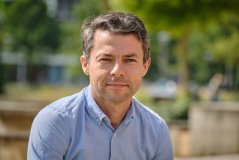
Interview
"Helping students explore data science"
Not all students that choose Wageningen for their education think of courses on (big) data, algorithms and Artificial Intelligence. Still, for science and their career, it is of paramount importance they learn about these things. As the education development coordinator at the Wageningen Data Competence Centre, Lukasz Grus has been working tirelessly for three years to include data science in Wageningen education. And with success: a new data science master's programme in the domain of Food & Health is under construction.
Why should students learn about data?
'Science, and this certainly is true for the Wageningen domains, is about measuring things. Thus, we gather huge amounts of data, from sensors that measure crop growth to exactly how much food a cow eats from its trough. The data must be used to ensure a more efficient, sustainable and healthy working method. So, the data must be analysed, and algorithms developed that enable computer programmes to measure and analyse autonomously: Artificial Intelligence (AI). You can see this in self-managing greenhouses, for example. These greenhouses use natural resources more efficiently and produce more. A great development.'
As soon as students are confronted with AI, their interest is peaked
You have been the motor behind data science in education for three years now. Was this aspect lacking?
'No. Data science is already integrated into Biosystems Engineering, Geo-Information Science and Bioinformatics. There, AI is also deployed extensively. Consider, for example, registering wildlife to fight poaching and mapping tropical rainforests using satellite imagery to prevent illegal logging. To introduce students outside of these domains to data science, we have developed general courses that all students can opt for since the 2019-2020 academic year. These courses range from introductory courses to advanced AI such as deep learning and machine learning.
Have you added anything else to the data science options?

'I aim to bridge the gap between technology and WUR's domains: agriculture, nutrition and health. There is an increasing focus on the latter two within society and within science. Wageningen focuses on prevention: how can you prevent diseases such as diabetes? The use of data science may not spring to mind immediately, but we do measure a great deal in that scientific domain. Smartwatches measure how much we move, our heart rate, and our oxygen saturation. All these data could be used for new applications, for instance, an app that tells you what groceries you should shop based on this information.'
Are these applications best suited for students who focus on humans?
'No, it is much broader. There are many applications you could consider within the domain of animal sciences. After all, there is a lot of measuring going on in that sector: Sensors register how much a cow eats from its trough, but also how often it chews the feed. All that information can be applied towards optimising the feeding process and animal health. And, data science is not reserved for humans or animals: consider the use of robots in greenhouses and fields, and precision fertilisation using drones.'
I aim to enrich more masters with data science
Isn't it strange that WUR has not included data science in some of its specialisations?
'WUR is incredibly dedicated to its domain and traditionally is not a broad-based university with a score of computer science study programmes. In that sense, it is no surprise that data science is not all that developed in some programmes. Students aren't always open to it. They often feel they have not opted for a study programme that includes deep learning and machine learning (both AI). But this is changing rapidly. The great thing is: once they have been introduced to the subject, through an optional course, for example, they are quickly interested. It can be a benefit in their future.'
Does knowledge of data science lead to a better career?
'Both in the private sector and in the science sector, there is a demand for students who have both domain-specific expertise and knowledge of data science. So yes, that combination can certainly boost students in their careers. Wageningen already has an excellent reputation in research. We are among the world-top of data science applications in our domain. Now it's a question of delivering more students that have that combination.'
What is required to achieve that?
'As stated, we now have optional courses available for all students. There are also Massive Open Online Courses (MOOC's) that are open to interested participants from across the globe. Moreover, I am working with the relevant programme directors to enrich existing programmes with data science. Three so-called inter-specialisations are to offer master's students of Nutrition and Health, Management, Economics and Consumer Studies and Communication, Health and Life Sciences the option of combining their specialisation with data science in this, just started, academic year.
I want to bridge the gap between technology and WUR's core domains
My goal is to achieve similar opportunities for many more master's programmes in the near future. In addition, we are developing a completely new master's that centres on data science for the coming academic year: Data Science for Food & Health. And we are also considering what other WUR domains could benefit from data science.'
Does WUR have the knowledge and skills to design these master's programmes?
'Yes. Moreover, that knowledge and skill are rapidly increasing at the moment. Last academic year, three full-time AI professors were appointed. The fact that WUR is investing considerably in data science is noticeable in the development of new master's programmes. This helps us move so fast. Incidentally, the different sciences groups share a sense of urgency: I need them in order to implement this educational innovation. I consider it a joint adventure that will enable us to train a new generation of scientists: bridge-builders between WUR's core domain and state of the art data science.'